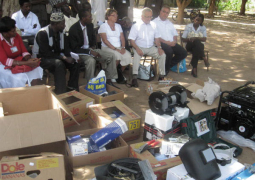
The
National Environment Agency, in collaboration with the Abidjan Convention, on
18 July 2018 commenced a four-day technical consultative meeting for
stakeholders as a preparatory step for the Conference of Parties (COPs 12)
summit in The Gambia.
The
Abidjan Convention is a comprehensive umbrella agreement, which came into force
in 1984, for the protection and management of the marine and coastal areas of
the South-Eastern Atlantic Ocean from Mauritania to the western seaboard of
South Africa.
Pollution
from or through the atmosphere and from ships, dumping, land-based activities,
exploration and exploitation of the seabed are among its pressing concerns and
issues, which require control.
The
convention has also identified environment management issues for which
cooperative efforts are needed, according the NEA.
These
include coastal erosion, specially protected areas, combating pollution in
cases of emergency and environment impact assessment.
The
Convention holds Conference of Parties every three years and the last was held
in South Africa in March 2014 where The Gambia was offered to host COP 12.
Speaking
at the opening of the four-day meeting, Ousman Sowe, permanent secretary of
Ministry of Environment, said The Gambia Government has developed and
incorporated a Vision 2020 development programme in which it commits itself to
conserve and promote the rationale behind the use of the nation’s natural
resources and environment for the benefit of present and future generations in
a manner that is consistent with the overall goal of sustainable development at
all levels.
He
said Vision 2020 is in harmony with The Gambia Environment Action Plan (GEAP),
and other natural resource sector policies as well as the Multilateral
Environmental Agreements.
PS
Sowe added that the consultative meeting came at a time “the Government of The
Gambia under the leadership of President Yahya Jammeh is making all necessary
efforts to improve the economic performance and quality of human life in a
sustainable way”.
“That
efforts to restore, maintain and enhance ecological processes, natural resources
and cultural and natural heritage, have been demonstrated with the ban on
plastic bags,” he said.
The
Director of Intersectoral Networks at the National Environment Agency, Momodou
Jama Suwareh, speaking at the meeting, said the Abidjan Convention is one of
the regional sea programmes of the United Nations Environment Programme.
He
said the Convention develops action plans which are comprehensive agreements
engaging governments in protecting the environment and cover a range of issues
including pollution, chemicals and ecosystems.
Richard
Dacosta of the Abidjan Convention Secretariat Convention spoke on the need for
update and enhancement of environment condition and policies to meet the new
challenges of sustainable development, such as climate change, poverty
alleviation and sustainable management of marine and coastal ecosystems, which
were “ignored at the time of the adoption of the Abidjan Convention”.



